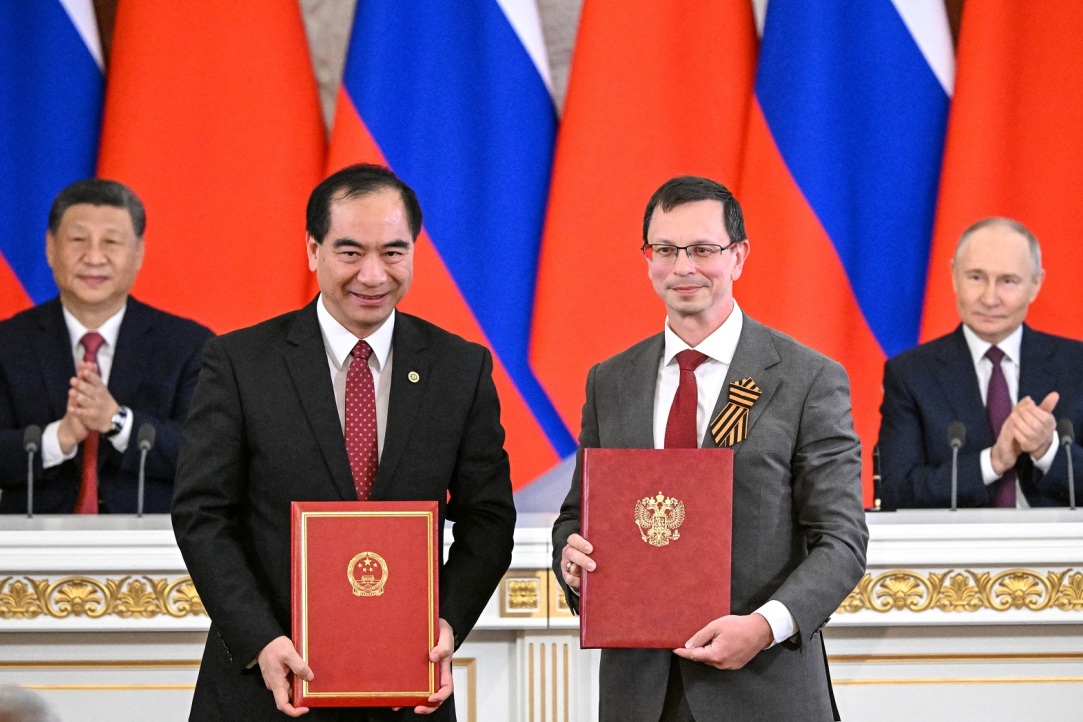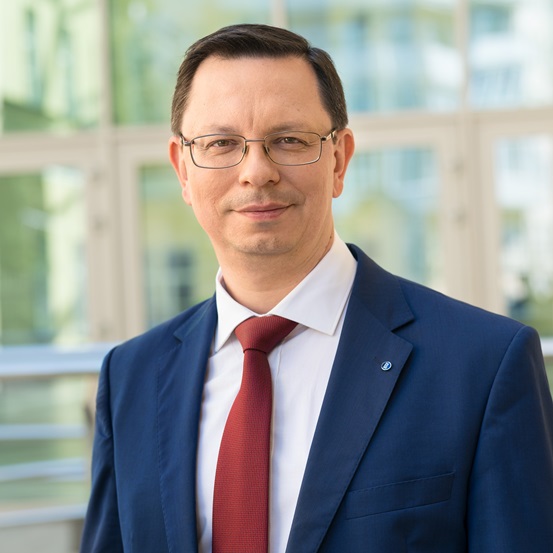HSE University Signs Cooperation Agreements with Leading Chinese Universities

On May 8, 2025, in Moscow, in the presence of Russian President Vladimir Putin and Chinese President Xi Jinping, strategic agreements were signed between HSE University and two of China's top institutions, Peking University and Tsinghua University. The event was attended by Nikita Anisimov, Rector of HSE University, Qiu Yong, Secretary of the CPC Tsinghua University Committee, and Gong Qihuang, President of Peking University. The signing unfolded during the official visit of the Chinese delegation to Russia, coinciding with the commemoration of the 80th anniversary of Victory Day.
These agreements mark a significant stride in advancing the strategic partnership between Russia and China, aimed at cultivating a unified academic space and reinforcing the BRICS institutional framework. By emphasising fundamental disciplines, both nations express a commitment to advancing research that paves the way for future technological breakthroughs.
The agreement between HSE University and Peking University focuses on enhancing scientific collaboration in natural sciences, including physics, chemistry, and advanced materials. The universities have embarked on a joint research initiative titled 'Engineering of Highly Efficient and Stable Perovskite Solar Cells.' This project became one of the winners of the HSE University competition 'International Academic Cooperation.' In this initiative, HSE University is represented by the Quantum Nanoelectronics Laboratory of the HSE Tikhonov Moscow Institute of Electronics and Mathematics.
Additionally, HSE University and Peking University will sign an agreement to establish a BRICS research platform. This collaborative academic space will enable Russian and Chinese researchers to delve into crucial areas of scientific enquiry, examine the operations of multilateral institutions, explore global governance processes, and analyse interactions between Russia and China in the field of international relations.
The cooperation agreement between HSE University and Tsinghua University is aimed at cultivating academic, cultural, and educational ties. This partnership will lay the groundwork for collaborative programmes, including research endeavours and student exchanges.
Today, HSE University stands as one of Russia's top universities focused on fostering a comprehensive partnership between Russia and China. The institution collaborates with over 40 leading educational and research organisations in China. HSE University offers a diverse range of bachelor's, master's, and professional retraining programmes centred on Chinese studies and engagement with China. Approximately 1,300 HSE students are currently learning Chinese, while more than 300 students from China are enrolled at HSE University, many through exchange programmes.
Looking ahead, HSE University aims to broaden its cooperation formats and introduce new initiatives with Chinese universities and research centres, emphasising the advancement of fundamental sciences and the enhancement of international scientific dialogue.

Nikita Anisimov, Rector of HSE University
'HSE University and Chinese universities are already connected through successful joint efforts. Recently, during our delegation's visit to China, our universities reached an agreement to further expand this partnership. We are confident that our new agreements with Peking University and Tsinghua University will not only strengthen bilateral ties and enrich cutting-edge scientific research but also propel the cooperation between Russia and China to new heights. Notably, our scientific collaboration with Chinese partners now includes a BRICS dimension: the member states play a crucial role in shaping a new multipolar global architecture, which necessitates comprehensive and profound expert examination of their interactions and influence on the international landscape.'
See also:
Scientists Test Asymmetry Between Matter and Antimatter
An international team, including scientists from HSE University, has collected and analysed data from dozens of experiments on charm mixing—the process in which an unstable charm meson oscillates between its particle and antiparticle states. These oscillations were observed only four times per thousand decays, fully consistent with the predictions of the Standard Model. This indicates that no signs of new physics have yet been detected in these processes, and if unknown particles do exist, they are likely too heavy to be observed with current equipment. The paper has been published in Physical Review D.
HSE Scientists Reveal What Drives Public Trust in Science
Researchers at HSE ISSEK have analysed the level of trust in scientific knowledge in Russian society and the factors shaping attitudes and perceptions. It was found that trust in science depends more on everyday experience, social expectations, and the perceived promises of science than on objective knowledge. The article has been published in Universe of Russia.
Institute for Robotics Systems Established at HSE University
As decided by the HSE University Academic Council, a new Institute for Robotics Systems will be established at HSE, and with a strong fundamental base. It will cooperate with relevant departments across the university and engage students and doctoral candidates in research and development (R&D). First Vice Rector of HSE University and Director of the Institute for Statistical Studies and Economics of Knowledge, Leonid Gokhberg, discussed the expected practical results and the framework for cooperation with an industrial partner.
Eighth International U4U Online Seminar Unites Experts from 14 Countries
The HSE Online Campus hosted a two-day international U4U (Universities for Universities) seminar, which traditionally serves as a platform for exchanging expertise in online learning. This year, the event has reached a global scale, attracting international experts and representatives of universities from around the world. Together, they discussed key challenges and strategies for the development of online education. The online meeting was held in mid-November.
HSE Tops Ranking of Universities Participating in Priority 2030 Programme
The Russian Ministry of Science and Higher Education has published an updated list of participants in the Priority 2030 programme. A total of 106 universities will receive support this year. HSE University was included in the first group and topped the ranking.
‘Keep Working, Keep Publishing—Consistency Matters’
Ziyuan Zhu, from Beijing, China, is an international PhD student at the Institute for Public Administration and Governance at HSE University in Moscow. In this interview with the HSE News Service, Ziyuan talks about how studies can influence one’s outlook on life, comparing public service models in different countries, and why being a Chinese student in Russia is advantageous in research.
HSE Psycholinguists Launch Digital Tool to Spot Dyslexia in Children
Specialists from HSE University's Centre for Language and Brain have introduced LexiMetr, a new digital tool for diagnosing dyslexia in primary school students. This is the first standardised application in Russia that enables fast and reliable assessment of children’s reading skills to identify dyslexia or the risk of developing it. The application is available on the RuStore platform and runs on Android tablets.
HSE Scientists Optimise Training of Generative Flow Networks
Researchers at the HSE Faculty of Computer Science have optimised the training method for generative flow neural networks to handle unstructured tasks, which could make the search for new drugs more efficient. The results of their work were presented at ICLR 2025, one of the world’s leading conferences on machine learning. The paper is available at Arxiv.org.
Under a Blooming Magnolia: How Russian and Chinese Scientists Create Solar Cells of the Future
Schola continues to introduce the winners of the International Academic Cooperation competition. In today's issue, Professor Andrey Vasenko, Deputy Head of the Scientific and Educational Laboratory of Quantum Nanoelectronics at Tikhonov Moscow Institute of Electronics and Mathematics (MIEM), speaks about the joint project between his laboratory and the Peking University research team— ‘Engineering of highly efficient and stable perovskite solar cells.’
Physicists Propose New Mechanism to Enhance Superconductivity with 'Quantum Glue'
A team of researchers, including scientists from HSE MIEM, has demonstrated that defects in a material can enhance, rather than hinder, superconductivity. This occurs through interaction between defective and cleaner regions, which creates a 'quantum glue'—a uniform component that binds distinct superconducting regions into a single network. Calculations confirm that this mechanism could aid in developing superconductors that operate at higher temperatures. The study has been published in Communications Physics.


